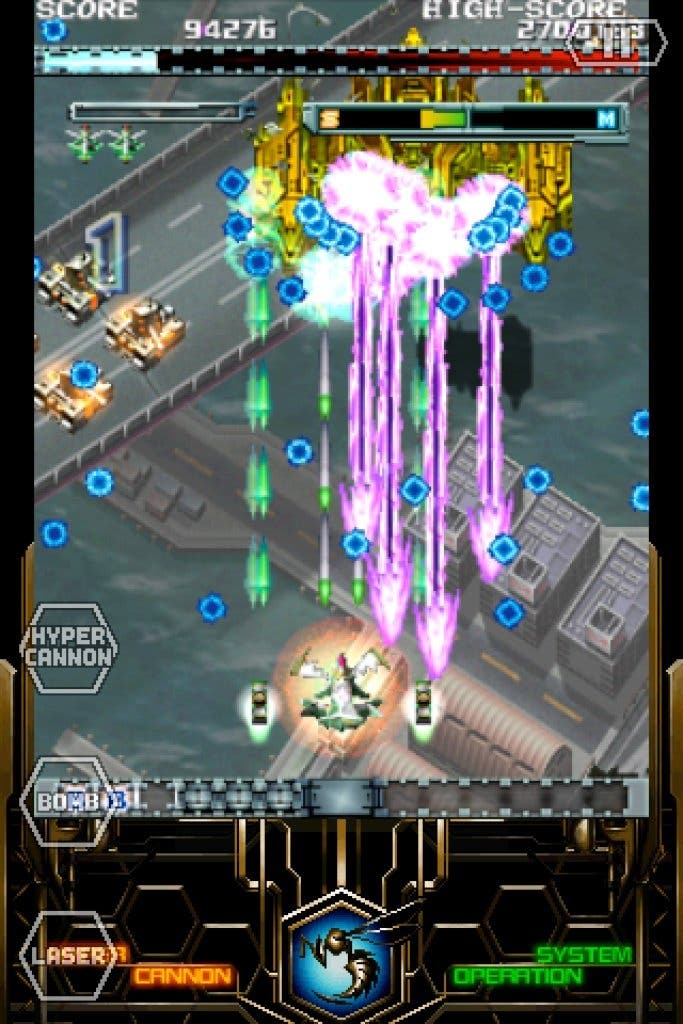Cave's Story
Bullet hell in downtown Tokyo.
In a world where the likes of Minecraft, Angry Birds and Canabalt consume countless hours of people's gaming time, it shouldn't come as a surprise to learn that hit games like Cave's shooters can be made with such small teams - just as they were in the eighties, no doubt. But somehow, it still seems shocking.
Ichimura isn't oblivious to the unique position Cave is in, either. When I mention that I know many developers working in enormous teams, on seemingly never-ending, high-budget projects, who would give up a kidney to swap places with him, he simply smiles and says, "I guess so."
It's not all a walk in the park. Cave's fearsome reputation for producing challenging, well-balanced games means that an enormous amount of time is spent on perfecting that balance.
"The basic adjustments to the game are made by the development team itself," Ichimura explains, "but sometimes we bring in well-known players and have them play the game too - that's something we've been doing recently.

"Our team plays the same section over and over to see if it's fun, if it's interesting, and if not they'll re-make the whole section. It's a pretty analogue approach to balancing, I think.
"Making a boss, for instance, takes between three weeks and a month. After I get the illustrations from the artist, it takes a week to create the basic framework of the boss, and then two to three weeks of coming up with all the attack variations - and within all those attack variations, all the different bullet patterns, the movement of the boss..."
Given Cave's rich treasure trove of much-revered classic games it's not surprising the studio spends a fair bit of its time porting those titles to new platforms, as well as developing entirely new games. Along with Xbox Live the iPhone is the break-out platform for Cave, with titles like DoDonPachi Resurrection enjoying solid success on Apple's iOS devices.
"Yes, the arcade industry is declining in Japan," admits Cave's mobile boss, Yukihiro Masaki. "At the same point in time, actually, Cave's existing mobile business was also shrinking. At the intersection of those two moments, we decided to try the iPhone platform as an experiment, just to see where it would go."

Where it went, as it turned out, was firmly in the direction of success - not just in Japan but around the world. The company's last game, DoDonPachi Resurrection, sold 30,000 copies in its first three days on the App Store, and that figure has now topped 40,000.
The numbers may not seem huge compared to sales of triple-A games, but bearing in mind the low cost of development and the fact that the game had already made a profit at the arcade, it's clear Cave has found a solid new business.
Besides, the company takes obvious pleasure in reaching a new audience of international fans. Masaki tells us happily about receiving a "very warm fan-letter from a fan in Israel - it was really enthusiastic, really great" after the launch of DoDonPachi Resurrection on the iPhone. He says that the company has been surprised and delighted by the level of feedback from abroad.
Even so, Cave doesn't seem likely to be swayed by its newfound international popularity. While enthused by reaching foreign fans, Ichimura is most animated when discussing the arcades - especially the incredibly skilled players in Akihabara ("it's kind of a special place"). They, he tells us, put even the best players in Cave's own offices to shame. Moreover, he's adamant that the new overseas audience won't change the company.
"Up to now, we haven't done an original title on 360. When we do we'll definitely take the international market into account, but in terms of changing the game's design or anything... We're not going to change our style. That's Cave's style."
And that has got to be just what the fans who work their fingers to the bone dodging the company's never-ending streams of bullets want to hear.
